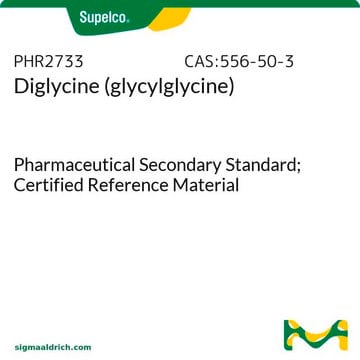50199
Gly-Gly
≥99.5% (NT), BioUltra
Synonyme(s) :
Diglycine, Glycyl-glycine
About This Item
Produits recommandés
product name
Gly-Gly, BioUltra, ≥99.5% (NT)
Gamme de produits
BioUltra
Pureté
≥99.5% (NT)
Forme
powder
Impuretés
insoluble matter, passes filter test
Résidus de calcination
≤0.05% (as SO4)
Perte
≤0.05% loss on drying, 110 °C
Couleur
white
pH
4.5-6.0 (20 °C, 1 M in H2O)
Plage de pH utile
7.5-8.9
pKa (25 °C)
8.2
Pf
220-240 °C
Solubilité
H2O: 1 M at 20 °C, clear, colorless
Traces d'anions
chloride (Cl-): ≤50 mg/kg
sulfate (SO42-): ≤50 mg/kg
Traces de cations
Al: ≤5 mg/kg
As: ≤0.1 mg/kg
Ba: ≤5 mg/kg
Bi: ≤5 mg/kg
Ca: ≤10 mg/kg
Cd: ≤5 mg/kg
Co: ≤5 mg/kg
Cr: ≤5 mg/kg
Cu: ≤5 mg/kg
Fe: ≤5 mg/kg
K: ≤50 mg/kg
Li: ≤5 mg/kg
Mg: ≤5 mg/kg
Mn: ≤5 mg/kg
Mo: ≤5 mg/kg
NH4+: ≤200 mg/kg
Na: ≤50 mg/kg
Ni: ≤5 mg/kg
Pb: ≤5 mg/kg
Sr: ≤5 mg/kg
Zn: ≤5 mg/kg
λ
1 M in H2O
Absorption UV
λ: 260 nm Amax: 0.075
λ: 280 nm Amax: 0.072
Chaîne SMILES
NCC(=O)NCC(O)=O
InChI
1S/C4H8N2O3/c5-1-3(7)6-2-4(8)9/h1-2,5H2,(H,6,7)(H,8,9)
Clé InChI
YMAWOPBAYDPSLA-UHFFFAOYSA-N
Informations sur le gène
human ... SLC15A1(6564)
Vous recherchez des produits similaires ? Visite Guide de comparaison des produits
Catégories apparentées
Application
- Structural and molecular insights into a bifunctional glycoside hydrolase 30 xylanase specific to glucuronoxylan: This study provides a detailed analysis of the enzyme′s structure and function, demonstrating D-(+)-Xylose′s role in enhancing our understanding of xylose metabolism in industrial applications such as biofuel production and biotechnological innovations (Pentari et al., 2024).
- Efficient production of 1,2,4-butanetriol from corn cob hydrolysate by metabolically engineered Escherichia coli: Highlights the utilization of D-(+)-Xylose from agricultural waste, optimizing processes for sustainable biofuel production, emphasizing the sugar′s pivotal role in renewable energy research (Li et al., 2024).
- Biochemical characterization of a xylose-tolerant GH43 β-xylosidase from Geobacillus thermodenitrificans: Provides insights into the enzyme′s biophysical properties and its utility in biotechnological applications, furthering the understanding of D-(+)-Xylose′s role in enhancing enzyme performance under various industrial conditions (Melo et al., 2023).
- Genome-scale metabolic modeling reveals metabolic trade-offs associated with lipid production in Rhodotorula toruloides: Explores how D-(+)-Xylose can be used to optimize metabolic pathways for improved lipid production, highlighting its potential in synthetic biology and metabolic engineering to enhance bioproduct synthesis efficiency (Reķēna et al., 2023).
Autres remarques
Code de la classe de stockage
11 - Combustible Solids
Classe de danger pour l'eau (WGK)
WGK 3
Point d'éclair (°F)
Not applicable
Point d'éclair (°C)
Not applicable
Équipement de protection individuelle
dust mask type N95 (US), Eyeshields, Gloves
Certificats d'analyse (COA)
Recherchez un Certificats d'analyse (COA) en saisissant le numéro de lot du produit. Les numéros de lot figurent sur l'étiquette du produit après les mots "Lot" ou "Batch".
Déjà en possession de ce produit ?
Retrouvez la documentation relative aux produits que vous avez récemment achetés dans la Bibliothèque de documents.
Les clients ont également consulté
Notre équipe de scientifiques dispose d'une expérience dans tous les secteurs de la recherche, notamment en sciences de la vie, science des matériaux, synthèse chimique, chromatographie, analyse et dans de nombreux autres domaines..
Contacter notre Service technique







